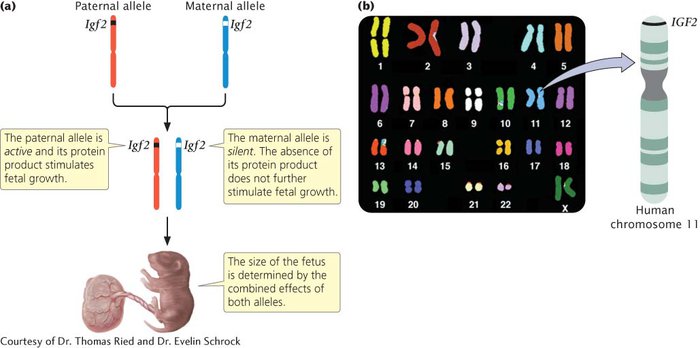Genomic Imprinting
A basic tenet of Mendelian genetics is that the parental origin of a gene does not affect its expression, and therefore reciprocal crosses give identical results. However, the expression of some genes is significantly affected by their parental origin. This differential expression of genetic material depending on whether it is inherited from the male or the female parent is called genomic imprinting.
A gene that exhibits genomic imprinting in both mice and humans is Igf2, which encodes a protein called insulin-

| Genetic phenomenon | Phenotype determined by |
|---|---|
| Sex- |
Genes located on the sex chromosome |
| Sex- |
Genes on autosomes that are characteristic more readily expressed in one sex |
| Sex- |
Autosomal genes whose expression is limited to one sex |
| Genetic maternal effects | Nuclear genotype of the maternal parent |
| Cytoplasmic inheritance | Cytoplasmic genes, which are usually inherited entirely only one parent |
| Genomic imprinting | Genes whose expression is affected by the sex of the transmitting parent |
EPIGENETICS Genomic imprinting is just one form of a phenomenon known as epigenetics. As we have seen, most traits are encoded by genetic information that resides in the sequence of nucleotide bases of the DNA—
In genomic imprinting, whether the gene passes through the egg or the sperm determines how much methylation of the DNA takes place. The pattern of methylation on a gene is copied when the DNA is replicated and therefore remains on the gene as it is passed from cell to cell through mitosis. However, the methylation may be modified or removed when the DNA passes through a gamete, so a gene that is methylated in sperm may be unmethylated when it is eventually passed down to a daughter’s egg. Ultimately, the amount of methylation determines whether the gene is expressed in the offspring.
These types of reversible changes to DNA that influence the expression of traits are termed epigenetic marks. The inactivation of one of the X chromosomes in female mammals (discussed earlier in this chapter) is another type of epigenetic change. We will consider epigenetic changes in more detail in Chapter 12.
CONCEPTS
In genomic imprinting, the expression of a gene is influenced by the sex of the parent that transmits the gene to the offspring. Epigenetic marks are reversible changes to DNA that do not alter the base sequence, but may affect how a gene is expressed.